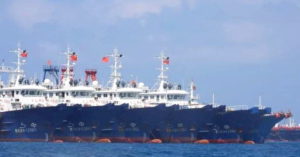“NAIVETÉ is doing the same thing over and over and always expecting the same result.” The great physicist Albert Einstein defined insanity as doing the same thing over and over and expecting different results. The message of this quote certainly rings true if one is to describe the tension-driven situation in the Ayungin or Second Thomas Shoal between the Philippines and China over the past 24 years.
It is a bit perplexing and baffling for the Philippines to expect a different reaction from China, as if China will bend its knees every time our side attempts to dispatch and transport construction materials to refurbish the dilapidated Sierra Madre Navy ship grounded in the troubled waters of Ayungin Shoal, banking on the illusion that the United States will back us up if the Chinese coast guard blocks the passage of boats carrying construction materials when it is a clear as day that fortifying and refurbishing the derelict Sierra Madre is a no-no for China since 1999.
Complexities and ‘business as usual’
It is already known to regional countries and even among enlightened Filipinos that the resupply of the humanitarian goods for our troops stationed in the dilapidated Sierra Madre ship, across time, though there were ups and downs, is something that China will not block and will concede with and has been carried for 24 years now since May 9, 1999. Just come to think of it, logically and rationally speaking, if China really wanted to stop the humanitarian supply for our troops stationed in the Sierra Madre, how come our troops in that shabby Navy ship are still alive and kicking for the past 24 years now? Is this rocket science for Filipinos not even to figure it out?
Since 1999, the Chinese have been consistent in their position that reinforcing, repairing, adding more troops and refurbishing the Sierra Madre, in China’s view, is a no-no. Humanitarian supply for the Filipino troops in the Sierra Madre is not a problem for the Chinese. As far as the Ayungin Shoal or Second Thomas Shoal is concerned, from my vantage point, China will exert all efforts and measures to preserve and maintain the status quo of the area as it asserts its claim in the same manner that we are asserting our claim that the Ayungin Shoal is part of our exclusive economic zone (EEZ).
China claims they have territorial sovereignty over the area, while we claim that we have sovereign rights because it’s part of our EEZ but not part of our territorial waters. Sovereign rights and territorial sovereignty are not the same, and this distinction is one of the sources of the complexity surrounding the dispute in the South China Sea (SCS).
On the other hand, the territorial sovereignty claim of Vietnam over Ayungin Shoal makes the whole situation of the contested waters of the SCS extremely complicated. For the nth time, Filipinos must come to terms with the fact that the SCS dispute is way more complex, thorny and convoluted without an easy and ready solution at this time. Resolving the dispute would entail all claimant states like the Philippines, China, Taiwan, Malaysia and Vietnam examining and looking at all these complexities and from there, come up with a middle ground and prescribe a solution. In doing so, being open-minded, rational, pragmatic and diplomatic are necessities to avoid escalating the already tension-driven and boiling atmosphere of the disputed SCS.
Moreover, it is also puzzling for the Philippines to have a business-as-usual approach and attitude whenever there’s a skirmish around the Ayungin Shoal or other parts of the disputed SCS. It seems that the Philippines is determined to continue with a “business-as-usual” approach of megaphone diplomacy, hyping up the issue and demonizing China by painting it as a bully which, by the way hasn’t worked for the last 24 years, and as if by doing all these, the SCS dispute will be resolved, and as if China will bend its knees. This is far-fetched. This can be likened to “political gaslighting,” where half-truths and speculations are used for manipulating the information to frame a narrative to influence and control people’s perception or confuse the Filipino people, making them anxious, fueling anti-China sentiment, which has no pragmatic value when it comes to finding a solution to the SCS dispute.
Hindsight
To put things in perspective, the recent skirmish in the Ayungin Shoal between the Philippine Coast Guard (PCG) and the China Coast Guard (CCG) is nothing new. Many similar skirmishes between the PCG and CCG have happened several times over the past 24 years. These kinds of skirmishes happen precisely because the area has been disputed for a long time. That’s the glaring reality.
But the most crucial consideration in situations such as this recent incident in Ayungin is the fact that no serious military confrontations tantamount to war had happened, and I guess that the most important thing to take note of and to avoid by all parties concerned. On the other hand, “making a mountain out of a molehill” and inflating the recent incident at Ayungin Shoal out of proportion is not at all helpful and a wise thing to do. It will just cause unnecessary irritation and turmoil between the two countries.
Likewise, too much politicization, speculations, the far-fetched and exaggerated way of depicting the recent Ayungin Shoal incident with the intended purpose of creating some level of commotion and apprehension in the country, distracting the Filipino people from the real domestic issues and problems that ordinary Filipinos are suffering such as the rice crisis, which is part and parcel of the food insecurity problem the Philippines is faced with, the oil and gas price hike, widespread corruption in government, the increasing criminality and resurgence of the drug problem in the country, will lead nowhere and will only muddle and worsen the already complicated and sensitive situation in the disputed SCS.
Likewise, the political grandstanding of some political personalities using the SCS dispute to boost their profiles for the upcoming midterm elections in 2025, spewing and embroidered half-truths beyond the realm of objectivity will also lead nowhere. It is definitely not helpful and does not contribute to the resolution of the dispute, but rather further inflames and exacerbates the already tension-driven and strained relations between the Philippines and China.
Naiveté
On another note, are we that naïve as a nation and as a people to even consider or think of “calling for a war” with China and label the recent water cannon incident in the Ayungin Shoal as a “declaration of war,” deceptively banking on the idea that the US will back us up in case a military confrontation between the Philippines and China erupts?
For more than a decade, although the US has actively supported the Philippines’ activities in the SCS through diplomacy, media hype and public opinion, there has been little direct support and intervention. Although the US military actively provided intelligence support, it did not directly provide on-site support the way the Philippines wanted.
Conclusion
The crux of the problem with our country is that we have unrealistic expectations from the US and a colonial mind. Likewise, this current administration is unrealistically and unpragmatically misjudging the likely all-out military support of the US, and the People’s Republic of China and the Chinese people’s strong and firm resolve to safeguard its territorial and sovereign interests in the areas of the SCS where it has claims. This is something that the Marcos administration needs to think through and probably ponder on before it’s too late.
But one thing is certain: a peaceful, pragmatic and diplomatic resolution of the SCS dispute through open-minded, respectful and sincere dialogue and negotiations, no matter how difficult, is a must and the optimal solution to the SCS dispute.
Trying to rely on the unreliable US promises to resist or fight China over the disputed waters of the SCS will only backfire, is counterproductive, dangerous for the Philippines and will aggravate the complexity and tension of the contested waters of the SCS.
All regional countries, including the Philippines, must safeguard peace and stability in the SCS. The world cannot afford another military crisis tantamount to a war on our side of the world. If peace, stability and security are to be sustained in the Asean (Association of Southeast Asian Nations) and the wider Asia-Pacific region, Filipinos and Asians must take center stage in resisting the costly consequences of geopolitics (wars and conflicts). In war, there are no winners, only losers.
In retrospect, the complications of geopolitics are indeed costly. The Philippines can’t afford it. However, the path toward economic development will benefit the Philippines and Filipinos. The path to peace creates security and stability, and we achieve economic prosperity through peace and tranquility.
Source: The Manila Times
https://www.manilatimes.net/2023/08/26/opinion/columns/how-ayungin-shoal-put-the-philippines-in-a-security-trap/1907062


